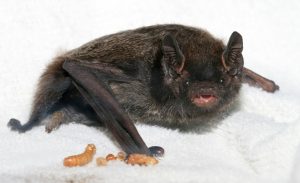Support Us
Since 1979 more than 140,000 animals have been treated by Wildlife Rescue.
Thanks to the support of individuals like you, Wildlife Rescue can provide a lifeline for animals in distress.
While the nights get longer and the weather gets colder, bats seek out places to hibernate. Bats may seek out abandoned mines, caves, and other shelters like peoples’ homes, barns, and garages.
While having a bat sharing the same space with you may seem a little scary, bats seek the shelter of your spaces, for survival. Micro species of bats, like Little Brown Bats, are vulnerable to predators that do not hibernate, like raccoons and owls.

You can try to prevent bats from entering your spaces, by trying to make your house harder to access. You can check for any loose boards or holes on the exterior of your home. They prefer to roost in corners, so pay particular attention to corner seams. You may also want to consider mounting a bat box.
Hibernation is not necessarily the restful sleep we may envision. Variables in temperature and humidity may cause a bat to fly around to seek a more comfortable spot. They will also wake up to varying sound and light. Considering the variation of all of these elements in our homes, you could end up with an active guest.
Since the reason for hibernation is for the bat to conserve energy, leaving a bat alone where it has roosted, is the best thing that you can do. Either to let it hibernate or to wait to get a wildlife professional to remove it.
To learn more about our bat friends click here